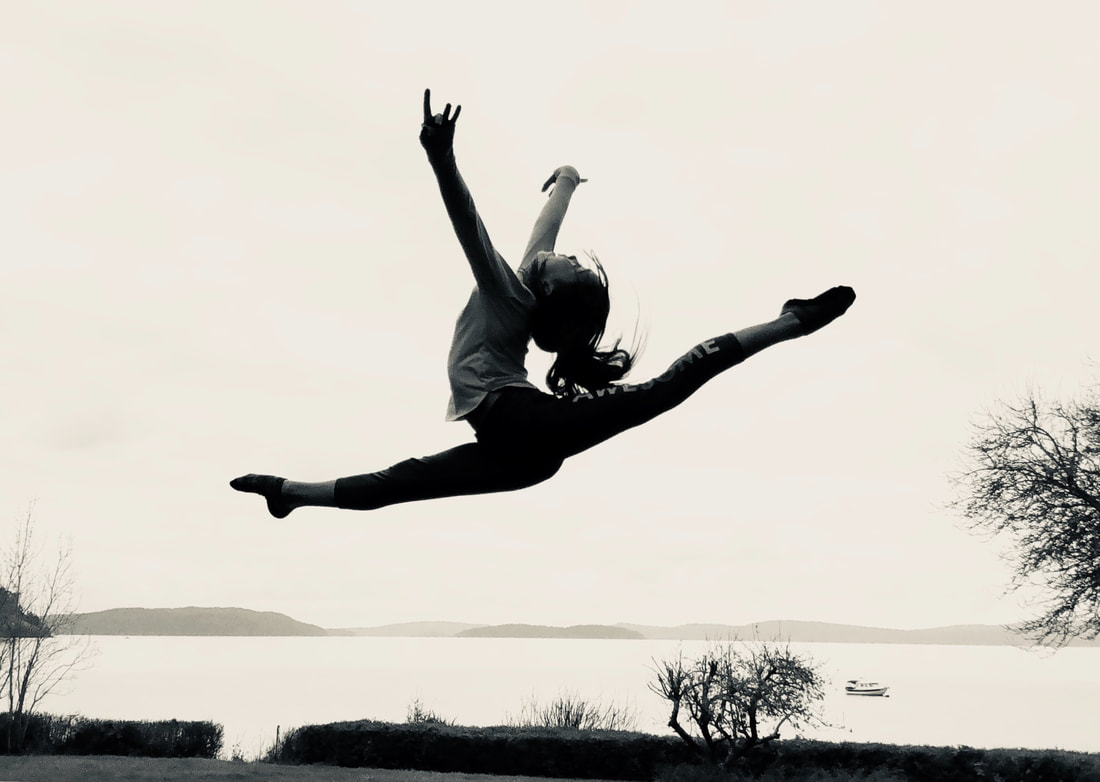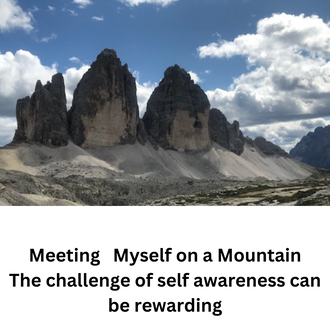|
Sometimes “Life does life and we must patiently persevere” said a friend recently. I believe this is true and I also believe that sometimes life provides us with ‘trampoline moments’
The few times I have been on a trampoline I had the feeling of being boosted (momentarily) above my life. It was a feeling of freedom from gravity. A laugh burst out---pleasure in releasing the habitual pulls of seriousness. It was a little scary too -- not knowing exactly where I would land. For me, the experience of ‘grace’ is quite similar. There are many definitions of grace most of them connected with God. This is my definition, more akin to synchronicity: A moment in time that has layers of synchronistic influence , feels like it moves me forward, has a connecting influence and helps me to feel/see the bigger picture. It is a rising up sensation I feel especially grateful for moments of grace that bounce me out of a stuck place. For example, if I am ruminating on lonlieness and unexpectedly someone reaches out. Or, I am grumping in my head about a friend and I hear a podcast that loosens my opinion of them. The important thing is to let these moments count, not to go rushing by but take note and add them up. Then I feel lucky! The feeling is the opposite of an obsessive controlling habit that grew out of my PTSD pattern. My close friends call it “the little red hen” in me. Some recent breakthroughs on changing this pattern have been: Being able to intuit what is the best intervention for my body pain (like which exercise) and then not overdoing it. Allowing myself time for pauses to actually listen rather than doing an exercise by rote. Another one was with my book efforts---sending a copy to a small bookstore in the states and then not obsessing about a response. I noticed that I quite awhile later I got an invitation from a small Canadian bookstore owner wanting to have my book in his store. As my book coach says “Be pro-active but then let go of the responsibility of ‘making it happen’ When I release the underlying fear connected with this pattern, I feel the ‘trampoline’ energy. I hope all of you have trampoline moments (or whatever reads as grace or synchronicity) in your life that enrich and calm your being.
1 Comment
I have met myself in many of my strengths and my weaknesses, in my uglies and my beauties and in my ‘cans’ and ‘can’ts’ when rising to the various challenges I have chosen, and that life has given me. And, found wonderful things: songs, people, awakenings, humility and much more. But, finding myself on a 10k hike around three peaks at an altitude of 7700 ft, with a variance of 300 meters that took 3 ½ hrs, in 7C temperature with a wind, was definitely a challenge.
I had prepared as much as I could given I was recovering from an odd hip problem connected with chronically straining to hear in noisy circumstances. Due to my long experience with facial paralysis (FP) and hearing disabilities I had learned the importance of preparing but I had never been on a long hike with elevations. I have a fear of heights. I get vertigo in a cold wind. I did not have hiking sticks or enough head covering or sunglasses (thank god there was minimal sun but it was a bright and barren landscape). The starting path was not too difficult and I held my flimsy hood tight around my head as I followed my husband’s footsteps, not able to look at the panoramic views. I felt scared but practised deep steady breathing and talking to myself. Halfway along the path there was a scramble up to the highest point of the hike. I grunted and grabbed for handholds and eventually made it to what is called a ‘hut’ but is actually a large solid building with a restaurant. I was sitting outside the main restaurant eating an apple and a hard Italian cracker, spacing out and hoping my hip would continue pain free for the remainder of the hike. I glanced at the table next to me. There was a group of several men and one woman. The woman was talking about the value of learning stuff from the internet and I noticed that she had facial paralysis. I thought, “How odd to see someone here with a facial disability”. In my entire life I had only met one other person with FP. (recently though, more online). I thought, “I should say hi”. But then I felt shy and somehow unworthy as I had been feeling the whole hike. I sat there frozen. But then when they got up to leave I felt so sad and thought, “I can climb up a mountain but I don’t have the courage to introduce myself to someone like me?” Suddenly I was on my feet following after them and hoping I would not lose them in the crush of people (yes there were a ton of people on this very popular hike) I saw them lingering on a lower level and quickly before the “stop” voice entered my head I introduced myself. Her name was Daphne and we exchanged relevant information—have you had it from birth, what is your diagnosis, have you had any procedures, what is your career etc. It turned out she was a musician too on a break from a cruise ship. It is so rare to meet someone with facial paralysis it is like meeting oneself (though of course there are always differences.) This meeting was especially meaningful because I had been encountering my disability through the challenge of the hike and sinking into what I call disability shame. After I met Daphne that shame evaporated and I felt proud of myself and even though the rest of the hike was hard, I knew I would make it. I had a strong feeling that I had met a new friend and that I was friends with my body again. Accepting my differences and giving myself the right amount of social and physical challenge made me feel worthy to be alive. What is your ‘mountain’? Do you have a way of discerning the right amount of challenge for you? |
AuthorKristi Magraw is known for having developed a unique synthesis of Eastern healing (Five Element theory) and Western ways of working with the mind, called the Magraw Method, which she established in 1979. This method uses metaphoric language and release techniques to help people heal physical and emotional pain. Archives
September 2023
Categories |


 RSS Feed
RSS Feed
